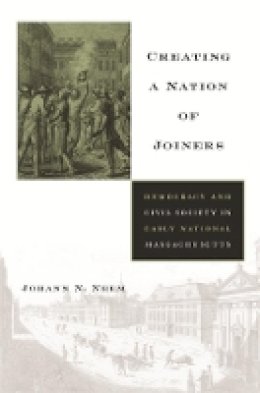
Creating a Nation of Joiners: Democracy and Civil Society in Early National Massachusetts
Johann N Neem
The United States is a nation of joiners. Ever since Alexis de Tocqueville published his observations in Democracy in America, Americans have recognized the distinctiveness of their voluntary tradition. In a work of political, legal, social, and intellectual history, focusing on the grassroots actions of ordinary people, Neem traces the origins of this venerable tradition to the vexed beginnings of American democracy in Massachusetts.
Neem explores the multiple conflicts that produced a vibrant pluralistic civil society following the American Revolution. The result was an astounding release of civic energy as ordinary people, long denied a voice in public debates, organized to advocate temperance, to protect the Sabbath, and to abolish slavery; elite Americans formed private institutions to promote education and their stewardship of culture and knowledge. But skeptics remained. Followers of Jefferson and Jackson worried that the new civil society would allow the organized few to trump the will of the unorganized majority. When Tocqueville returned to France, the relationship between American democracy and its new civil society was far from settled.
The story Neem tells is more pertinent than ever—for Americans concerned about their own civil society, and for those seeking to build civil societies in emerging democracies around the world.
Product Details
About Johann N Neem
Reviews for Creating a Nation of Joiners: Democracy and Civil Society in Early National Massachusetts
John L. Brooke, Ohio State University Beautifully conceived and clearly written, Creating a Nation of Joiners is a major contribution to our understanding of the early Republic. Not only does it nicely show how bitterly contested was the struggle over the creation of a civil society, but it contains the best account of the changing nature of the corporation since Oscar and Mary Handlin's Commonwealth. A superb study.
Gordon S. Wood, Brown University In his illuminating examination of the origins of American civil society, Johann Neem traces them to popular religion and Whig philanthropy, revealing the longstanding conflicts between civil society and the ideals of Jeffersonian democracy. This book will interest both historians and political scientists.
Daniel Walker Howe, author of What Hath God Wrought: The Transformation of America, 1815–1848 This work will broaden understanding of the Jefferson/Jackson period and the rise of democracy. Neem has done a superb job in crafting a short, readable, informative work.
J. J. Fox Jr.
Choice
